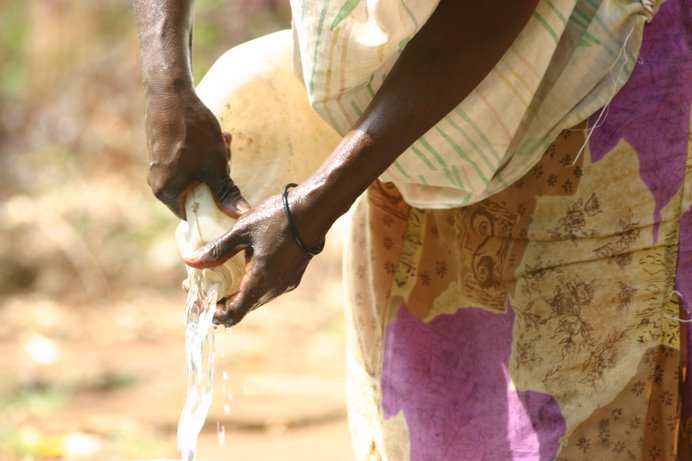Many Kenyan women I know are very much like the Proverbs 31 Woman. They consider fields, they rise before dawn to care and prepare for their families, they save for the servant girls, give to the poor, they’re good money managers, business women…Their children call them blessed and so do their husbands. Their arms are strong for their task and so is their neck.
Life in Bible times is much more accessible to my mind and more palatable to my understanding since tasting Kenya. In Kenya, you don’t need to weasel your way into this passage and spend time thinking about how it translates into your life. A Kenyan woman often considers fields, and when it belongs to her family, she digs and digs. She prepares the shamba with rhythmic, forceful swings of the jembe. She raises it above her head and releases it down with a noise that resonates out of the ground and changes depending upon the last rain. Black cotton soil cracks in the sun and makes short, struggling chlink chlink sounds as the metal edge picks its way through. The sound of wet soil is more of a shlink, shlurp, suctioning sound. The wet soil is like a hostess who quickly and warmly welcomes you in, but then clings to you, hanging as you make your way to the door, not wanting you to leave.
Many families have house girls who are usually a younger relative like a niece or a cousin or a sister who want a change of pace from their home or need a sure meal and a place to sleep. They take girls, and often treat them like daughters in a way.
“Her husband has full confidence in her and lacks nothing of value. She brings him good, not harm, all the days of her life.” This makes me think of David and Meshack, the two fathers on the farm, and how they love and trust their wives, Anne and Susan. They adore them and respect them and are always being thoughtful towards them. The word “confidence” is the perfect word to describe their stance toward their wives. They make decisions together a lot more than other couples that I see in the area and they also like doing things together. I am delighted when I hear things like this: David says, “ Oh, let me just pull over here and buy some tomatoes for Anne, she will be so happy.” Meshack says, “You won’t mind, what I am gonna do, is to stop and pick up some bananas because my wife loves to eat bananas.”
“She sees that her trading is profitable, and her lamp does not go out at night.”
I think of Anne Isuvi measuring their milk out to people who come to her kitchen to buy. I think of Rosalyn and Juliet who have little shops in their homes where they sell the essentials: soap, Roico seasoning, little yellow balls of cooking fat wrapped in plastic, sugar, salt and matchboxes and kerosene. I see Rosalyn’s head balancing a load of firewood, which she traded by giving an old Mama some beans to plant. Her trading is profitable; she knows what her family needs and what she has to give. They trade buckets of maize for a day’s labor of weeding in the field and trade vegetables for vegetables.
“She opens her hands to the poor and extends her hands to the needy.” I see Rosalyn wrap up a hot chapatti in a torn corner of the flour sack and send it home with the lady whose house burned down last year. I see her piling mounds of popped corn, hot off the fire, into the cupped hands of the little raggedy boys sent to her to fetch their family’s milk for chai. They sit on stools and stuff the popped corn into their mouths with both hands held close to their face for easy access. Their teeth and the whites of their eyes match the popped corn and they all work in unison to fully satisfy Rosalyn’s generosity.
Sizco sits shredding greens for Anne and the next minute is helping Kimae prepare chapattis for the apprentices to bring for the potluck. Nancy is bending thoughtfully over Lucas’ math problem, explaining his confusion away. Anyone who comes to chat while you’re in the middle of something, will automatically take up the task with you and talk for a bit. Kenyan women actually do get up while it is still dark and rarely eat the bread of idleness. Susan does make garments and sell them, and the women I know watch over the affairs of their household with a care and dedication that leaves little time for the distractions of luxury.
Nehemiah families begin to have a higher propensity to honor instead of blindly expect the dedicated labor and noble character of the woman of the house. “Her children arise and call her blessed; her husband also, and he praises her: Many women do noble things, but you surpass them all. Charm is deceptive and beauty is fleeting, but a woman who fears the Lord is to be praised.”
Monday, October 25, 2010
Subscribe to:
Post Comments (Atom)






1 comment:
hi ann! i have been thinking about you lots lately, hope you are doing well, would love to hear from you whenever you have a chance!!! love you!
Post a Comment